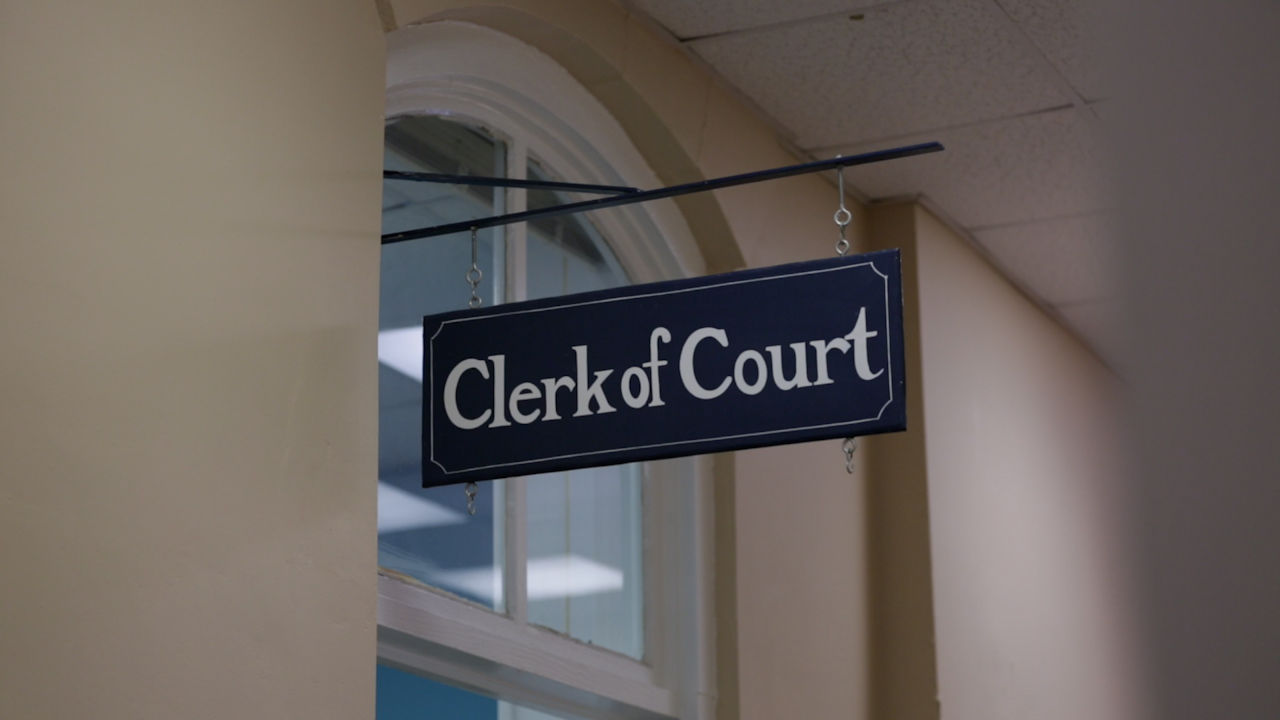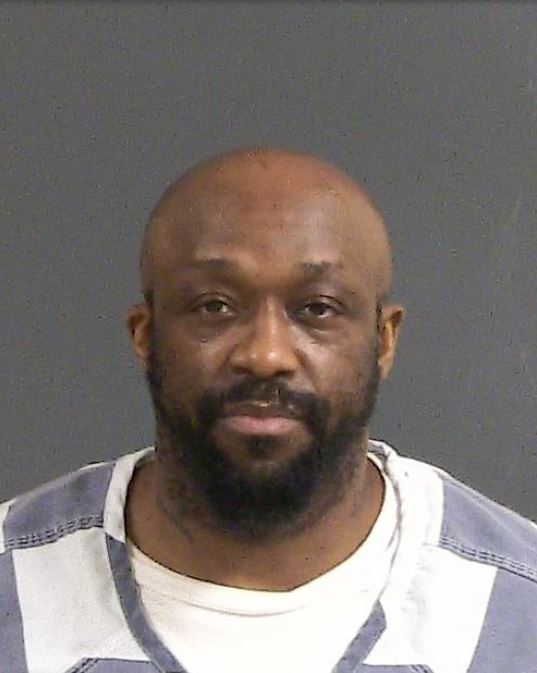Up to 200 bench warrants intentionally ‘shredded’ in Marlboro County: SC Clerk
MARLBORO COUNTY, S.C. (QUEEN CITY NEWS) — Felicia Henderson wasn’t about to give up, so she kept calling. And showing up.
As the victim in a domestic violence case, she was livid that her estranged husband – whom she accused of beating her in a gas station parking lot in July 2022 – was never arrested for failing to show up for a court hearing last October.

That October hearing was for Demarkest Anderson, the accused abuser, to answer for a charge of violating the protective order in the domestic violence case from three months earlier.
Bennettsville Police arrested Anderson on Sept. 12, 2022, after Henderson told officers her estranged husband confronted her at a grocery store in town.
The next term of circuit court was set for the week of Oct. 13, 2022, but when Anderson didn’t show the court issued a bench warrant for his arrest.
She kept calling the Marlboro County Clerk’s Office to find out why her estranged husband wasn’t off the streets. The clerk’s office told the victim they issued a bench warrant on Oct. 23, 2022 – just 10 days after Anderson didn’t show up for a court appearance.
The bench warrant was delivered to the sheriff’s office that week and the clerk assumed deputies were searching for Anderson.

Joy Williams, the county’s elected clerk of court, told Henderson to check with the sheriff’s office on whether they’d served the bench warrant. Henderson said she called the sheriff’s office warrant clerk who told her a bench warrant for her accused abuser didn’t exist.
That phone call would uncover something inside the Marlboro County Sheriff’s Office that no one, not even the new sheriff’s administration, knew was going on for the past several years.
‘HUNDREDS’ OF BENCH WARRANTS MISSING
When Queen City News went into the Marlboro County Clerk’s Office on July 21, the deputy clerk was flipping through a stack of pending bench warrants. At the time, the general sessions court had 461 cases where a bench warrant was issued and the case was still pending.
The ‘Failure to Appear’ list showed a sharp spike in bench warrants starting in 2012 and 2013 and continuing through July 2023.
The clerk’s office is having to pull every court file on the list to look for the original copy of the bench warrant in the file folder. If they find a bench warrant with the clerk’s signature, the clerk then has the sheriff’s office check its files for a copy.

If the sheriff’s office doesn’t have a copy, Williams has to re-issue the bench warrant and send the warrant to the sheriff’s office to track the defendant down to arrest them.
As of now, the clerk said she’s found more than 100 bench warrants she issued missing from the sheriff’s office files.
But she estimates that figure could double as the work continues to verify missing bench warrants.
“There’s almost 500 pending bench warrants. Now, how many of those I signed and how many circuit court judges signed, we have yet to determine. But we’re thinking it’s over 100 maybe close to 200,” Williams told Queen City News Chief Investigative Reporter Jody Barr during an interview last month.
“A victim kept contacting our office and she was told that there was an active bench warrant from last fall, but the sheriff’s office – the girl out there kept saying there wasn’t one,” Williams said. ‘The girl,’ is the warrant clerk at the sheriff’s office: Sandy Wilkes.
While the clerk’s office was investigating what happened in the Anderson case, so was the sheriff’s office. After the clerk’s office asked Chief Deputy Larry Turner why Anderson wasn’t arrested nine months after the bench warrant was issued, Turner went to work to figure that out.
Turner’s first stop: the warrant clerk’s office about 30 yards down his office hallway.
‘SHRED’ THE CLERK’S BENCH WARRANTS
When Chief Deputy Larry Turner read the text from the clerk’s office on July 10 telling him about the domestic violence victim’s calls, he dropped everything he was doing and went straight to his warrant clerk’s office.
All Turner knew at the time was the clerk’s office had a copy of an active bench warrant on Demarkest Anderson, but the sheriff’s office didn’t. Turner said he had no reason to think this was nothing more than a paperwork mistake that he could easily fix.

Until he questioned Sandy Wilkes and learned the Anderson bench warrant was sent to the sheriff’s office but was destroyed.
Turner asked the clerk to email a copy of the Anderson bench warrant to him.
“I then inquired with Mrs. Wilkes again and showed her the email of the warrant, at which time, she advised me that (Suspended) Sheriff Lemon directed her to shred any warrants that were issued by Clerk of Court Anita Williams,” Turner wrote in a July 11, 2023 email to the clerk’s office and to interim Sheriff Larry McNeil.
Former Sheriff Lemon was suspended from office on Dec. 14, 2021, after a body camera recording of an assault of an inmate at the county jail led to the sitting sheriff’s indictment.
Lemon was removed from office on Dec. 14 and Interim Sheriff McNeil took over the following morning.
“I actually talked to the individual here at the sheriff’s office over our warrants and she was advised under the old administration that any warrants that were issued by the clerk of court, they would not serve them and for them to shred them,” Turner told QCN in an interview in July.
“Why would a sheriff in South Carolina give an order to shred a court document?” Barr asked Turner, “That I could not answer, I do not know,” Turner replied.
The sheriff’s office went to work serving the re-issued bench warrants. Within 24 hours of receiving the confirmed list of re-issued bench warrants from the clerk, deputies hauled ten wanted men to the county jail.
Charges in the round-up included felony assault, pointing a gun at another, sex crimes against a child, and two men wanted for domestic violence. Those arrested on the bench warrants will have to wait until the week of Sept. 5 to go before a circuit court judge to ask to have the bench warrant lifted and to have a bond set.
Turner said the sheriff’s office is still getting additional re-issued bench warrants from the clerk’s office as the clerk continues reviewing all 400-plus pending case files.
“It has put the victims at risk because the individual not being arrested, a warrant signed on him could lead to other incidents. Secondly, it puts us in a position, being a small agency, now we’re gonna get a lot of warrants reissued to us that we need to get served in a timely manner. So, the victims will have the right to due process,” Turner told QCN.
The sheriff’s office can’t estimate the time or cost to taxpayers the warrant shredding has caused.
“It takes a lot of hours and work put in trying to locate and figure out which cases you know, these bench warrants were issued on. And once they come to us, yes, it will require some additional, probably overtime for us to be able to get as many of these warrants served as possible as quickly as possible.”
Turner said the sheriff immediately stripped Wilkes of her duties in handling criminal warrants. She’s now working as the office’s victim advocate and only handles civil warrants. The criminal warrants and entering those defendants into the National Crime Information Center is handled by another deputy, Turner said.
“Do you have any idea at this point how long this was going on?” Barr asked. “No, I couldn’t tell you how long this went on. I don’t have a clue.”
SLED’s BACK IN MARLBORO COUNTY
Not long after the sun rose over the Marlboro County Courthouse on July 26, QCN was outside the courthouse waiting for the sheriff’s transport vans to arrive. We were looking to get video of Demarkest Anderson as he faced a judge for a motion to lift his bench warrant.
Anderson had been locked away in the county jail since July 11.
Before the jail vans arrived, Barr spotted two unmarked law enforcement SUVs circling the courthouse. Inside were two SLED agents looking for a parking spot.

Those agents had just left the sheriff’s office where they interviewed Sandy Wilkes in an interview room. That interview centered on the complaint the sheriff’s office filed with the SC Law Enforcement Division just a few days before.
The agents walked through the main doors of the courthouse, down the hall past the probate judge’s office, and into the clerk’s file room. They were looking for Clerk Joy Williams.
Williams was sitting in on a murder trial upstairs and left the trial to meet the agents inside her office. The agents spent more than an hour collecting Williams’ statement; a signal that the state’s top law enforcement agency had opened an investigation into how hundreds of bench warrants ended up in a sheriff’s office shredder.
And why.
QCN made several attempts to ask Sandy Wilkes for an interview – including asking the sheriff and Turner to relay our request, but Wilkes never responded. QCN found her leaving the sheriff’s office that afternoon and questioned her about her allegations that suspended Sheriff Charles Lemon directed her to shred bench warrants signed by the clerk instead of the circuit court judge.

“No comment,” is the only response Wilkes gave as she got into her patrol SUV and drove away from the office. Wilkes has not responded to any of our requests to talk since.
The clerk told Barr in the July 21 interview that she didn’t know exactly why Lemon would have targeted her bench warrants, but did have the story of an incident that happened that could provide a motive, she said. Williams said she’d relay that story to SLED agents if they showed up to question her one day.
She got her chance to tell agents that story just five days later.
The clerk guessed that Lemon might have assumed she didn’t have the authority to sign a bench warrant – the only logical explanation for what happened, she said.
The South Carolina Attorney General’s Office issued a legal opinion on whether an elected court clerk has the authority to sign a bench warrant. The March 2, 2020 opinion issued to Horry County Clerk Renee Elvis delves into the power of a clerk when it comes to issuing and lifting bench warrants.
The AG’s opinion, which is the legal opinion of the state as the office believes a court would rule on a matter, wrote that a clerk’s issuance of a bench warrant “requires express direction from a court.” That reference was pulled from Rule 30 of the SC Rules of Criminal Procedure which states, “This rule further provides that bench warrants require ‘either the signature of the trial judge or the signature of the respective clerk of court at the direction of the trial judge.'”
“Court rules allow for a clerk of court to sign a bench warrant at the direction of the court,” the opinion stated. The opinion also referenced a prior opinion on the topic issued by the office in 1966, which the AG said still holds true today.
The bench warrant form is a standardized form used in all 46 counties in the state, Williams said. The form includes a signature line with an option for the clerk or the judge’s signature.
“I just wish that the previous administration out there had checked on it instead of shredding the warrants, or even just turn the warrants back in and said, I’m not gonna serve them if it’s got your name on it,” Williams told QCN.

Williams said she had no idea her bench warrants were being shredded and doesn’t yet know when this started.
“I didn’t know when until this victim kept coming forward and coming forward. And she was just really upset because the man was not in jail,” Williams said.
SLED said its investigation is not finished and did not have a timeline on how long it could take agents to finish it.
ACCUSED MURDERER WANTED
On Jan. 23, 2018, Deshawn “Shorty” Williams started his final day on earth inside the Evans Correctional Institution, a medium security state prison in Marlboro County.
Shearon Lamar Bennett and another inmate “willfully, feloniously, and intentionally” used a homemade “shank” to stab Williams to death, according to an arrest warrant and indictment charging Bennett with murder and possessing a weapon during the commission of a violent crime.

Although the murder happened in January 2018, the South Carolina Department of Corrections Police Services didn’t get a murder warrant for Bennett until June 2019, 17 months after the killing. The warrant shows SCDC didn’t serve Bennett with the charge for another month and a half.
That means the Marlboro County grand jury couldn’t indict the case until October 2019, 21 months after investigators claimed Bennett killed Williams.
Bennett was in Evans Correctional serving a 15-year sentence for the shooting death of April Infinger in Berkeley County in December 2013. Originally indicted on a murder charge, Bennett later worked out a plea deal with the Ninth Circuit Solicitor’s Office and pleaded guilty to involuntary manslaughter and firing a gun into a dwelling.
Bennett got five years for killing Infinger and 10 years on the shooting into a dwelling charge. The plea agreement allowed Bennett to avoid a trial and the potential life sentence on a murder conviction.
At the time of Infinger’s death, Bennett had already served stints in prison for a string of felonies including stolen cars, armed robbery, and a federal conviction of possession of a weapon by a convicted felon. Bennett served 70 months on the federal weapons charge and was on supervised release when he shot and killed Infinger in 2013.
In July 2016, Bennett entered guilty pleas in the Infinger death and started his 15-year sentence that month. However, despite the additional murder charge while imprisoned in Marlboro County, Bennett was freed from prison in November 2021, a little more than five years into his prison sentence.
But Bennett was not yet a free man.
Marlboro County had a detainer placed on Bennett on the murder charge and SCDC released him to the custody of the Marlboro County Sheriff’s Office. The U.S. Marshals Service was supposed to have placed a detainer on Bennett while at SCDC, but the U.S. Marshals “did not let the Marlboro County Sheriff’s Office know about the federal detainer” it had on the accused killer, according to Fourth Circuit Solicitor Will Rogers.
Rogers contacted Bennett’s federal probation officer when QCN contacted the solicitor asking about the bench warrant issued for Bennett.

Days after his release from prison, Bennett was taken before Circuit Court Judge Michael Holt for a bond hearing on the murder and weapon possession charges. Bennett’s National Crime Information Center report – a law enforcement database operated by the Federal Bureau of Investigation – contained information that Bennett was a “criminal gang member,” prohibited from possessing guns or ammunition, and SCDC’s Criminal Gang Group listed him in a “Threat Group.”
That NCIC report was in Bennett’s case file when he appeared before Holt for his bond hearing in December 2021.
Despite Bennett’s record, Holt set Bennett’s bond at $25,000 and ordered him to wear a GPS monitor. Bennett was released from the county jail two days later after Woods Bonding, a Dillon County bail bonds company placed the GPS monitor on Bennett.
The solicitor confirmed to QCN that Bennett was scheduled for a court date in March 2022 and showed for it. Bennett gave an address in Cross, SC and the solicitor said Bennett was set to appear in a Marlboro County courtroom again on June 30, 2022, but did not show.
The clerk’s office issued a bench warrant on July 14, 2022, and sent a copy to the Marlboro County Sheriff’s Office to have a deputy serve the warrant. The clerk said that the warrant was shredded and never served.
The sheriff’s office said the warrant was also not entered into NCIC by the warrant clerk. Meaning the county had no idea where Shearon Bennett was and no other law enforcement agency in the nation would know he was wanted in Marlboro County.
In QCN’s work to piece the timeline together on where Bennett went after the March 2022 court hearing, we found he left for Michigan. Although Bennett was supposed to be under GPS monitoring, nothing in his case file shows his bondsman or the solicitor’s office ever notified the court in Marlboro County.




Bennett’s bond paperwork does not show he was allowed to move to leave the state. The solicitor also confirmed he had nothing showing Bennett was allowed to be in Michigan, which should have triggered a bond revocation.
Oakland County, Michigan court records show deputies arrested Bennett on May 9, 2022, for possession of a concealed firearm. Law enforcement removed Bennett’s GPS monitor at the time, the solicitor said and the bondman contacted the solicitor’s office to inform them of the arrest. Rogers’ office did not file a bond revocation at the time and said prosecutors had no idea Bennett had left the state while on bond.
Bennett pleaded guilty to the weapons charge and was sentenced to a year in the county jail there. Bennett was incarcerated in Michigan when he missed the June 2022 court date in Marlboro County. He was released to the U.S. Marshals on the detainer that should have been in place when SCDC released him to Marlboro County in November 2021.
The feds took Bennett before a federal magistrate outside of Detroit for a detention hearing on Jan. 23, 2023. Assistant United States Attorney Regina McCullough told the judge Bennett was given permission to leave South Carolina and move to Michigan on bond, but nothing in Bennett’s case file shows this.
The federal judge in Michigan acknowledged a series of errors in South Carolina allowed Bennett to go free when he shouldn’t have. The judge also couldn’t find that Bennett was not a flight risk or a threat to society.
Federal prosecutors also could not confirm Bennett’s SCDC prison murder charge at the hearing in January – Chief Turner believes if the bench warrant wasn’t shredded and entered into NCIC, the confusion on whether Bennett was wanted in SC would have never happened. Here’s a partial transcript from the Jan. 23, 2023, detention hearing:
JUDGE ANTHONY P. PATTI: “Are there pending murder charges against him?”
DEFENSE COUNSEL: “I don’t have information about that, Your Honor. I saw that. I mean, I should say the probation officer did print a lien from the county from down in South Carolina that appears to show that there were charges filed, but we don’t have any sort of resolution of that. And I have not been able to – there was also, at the same time a criminal conspiracy charged at really the same date. And there is a note there that there was a non-conviction and a dismissal. But I have not had time to sort out exactly what’s happening with that South Carolina case.”
Bennett’s defense attorney in Michigan told the judge his client had fathered a child with his fiancé in Michigan and was living with her there. The attorney also argued Bennett was doing what he was supposed to do in his move to Michigan, “I think that there is – he’s somebody who basically came to Michigan. He was following the rules in terms of that, in terms of he did his time in Oakland County. I don’t want to get into the facts of that case, but he only got served a year and did the time for that. He’s ready, they have the ability to get him a flight to South Carolina to face the charges down there, whatever conditions this court will set.”

The government countered, “Counsel indicated that while he (Bennett) was on bond here, he was following the rules, and that is just not the case. Your Honor, he was on a tether. He was on bond to the court in South Carolina, and he committed a new offense, that clearly is not following the rules. And so, I would just propose, Your Honor, as I’ve indicated before, of the defendants engaged and involved with numerous firearm offenses, even discharging them and so we would propose that he remains a danger to the community, and he should be detained,” McCullough told the judge.
Judge Patti denied Bennett’s request to be set free.
“I can’t find by clear and convincing evidence because of the history here involves convictions for firearms, not just possession, but discharging firearms, which included the loss of life,” Pattie said in the hearing, “Was reduced to an involuntary manslaughter, but that’s still a homicide offense and you never actually should have been in a position to come to Michigan if the detainer had been honored by the state court in South Carolina. You shouldn’t have been here in the first place, but then you got here and when you got here, you were then convicted of yet another firearms offense, and that while you’re on tether.”
“And now, as far as all the information I have in front of me here, still pending charge for murder, and that has not been refuted here in court, but even if it has been refuted, the court finds that you keep going back to same, the same dangerous situation, which is that you keep going back to firearms and you’ve used firearms before, you’ve possessed firearms before, you’ve been convicted of it before, you served time for it and nevertheless here you are again while on a tether here in Michigan being found with a firearm and in your past, some pretty significant history.”
THE BONDSMAN ANGLE
QCN contacted James Woods, owner of Woods Bail Bonds and Extreme Monitoring, to find out whether Woods was actively monitoring Bennett on Judge Holt’s bond and who gave his client permission to move to Michigan. “I don’t think all the facts are in just yet,” Woods told Barr in an August 17, 2023, phone call.
“We’re gathering facts now,” Woods said. The bondsman claimed Bennett was living in Michigan prior to being bonded out of the Marlboro County jail in December 2021, but he was not.
Bennett was incarcerated in the SCDC system since 2016 on the Berkeley County shooting. Also, Bennett’s bond paperwork signed the day he left the Marlboro County jail shows an address on Harley Circle in Cross, SC. Woods’ bond runner, Eric Bass, signed off on the form at the time.

When confronted with this information, Woods told Barr he would call back with confirmed facts from Bennett’s file. Woods never called back as he said he would on August 17.
Rogers said his office has not filed any bond revocation motions in Bennett’s case and has not yet decided whether to seek forfeiture of Bennett’s $25,000 bond from the bonding company. Rogers said he can’t remember a case where he’s sought to estreat a bond in Marlboro County in recent years.
Rogers confirmed Marlboro County does not have a way to place a detainer on Bennett unless and until his bond is revoked on the SCDC murder charge. If he’s revoked, Rogers said deputies could then place a detainer on Bennett and when he’s released from federal custody, he could be brought back to Marlboro County to have another bond hearing.
Meanwhile, Deshawn “Shorty” Williams’ family is now nearing their sixth year waiting for Marlboro County prosecutors to take the murder case against Shearon Lamar Bennett to trial.
Solicitor Rogers told QCN he does not yet have a timeline on when Bennett could stand trial on the murder charge.
SUSPENDED SHERIFF CHARLES LEMON
QCN’s attempts to interview suspended Marlboro County Sheriff Charles Lemon led us to Dillon County, SC. A rural county split in half by Interstate 95 and home to South of the Border, the roadside attraction along the North Carolina border.
Lemon was suspended from office on Dec. 14, 2021, the day the Marlboro County grand jury indicted him after a body camera video surfaced showing former Deputy Andrew Cook repeatedly using a taser on an inmate inside the county jail while Lemon stood by ordering Cook to “Pop it to him,” and to “Stick that taser to his head,” as Jarrel Johnson lay on the jail floor seizing under the shock from the taser.

The governor suspended Lemon from office that day and Lemon has not worked in law enforcement while awaiting trial.
QCN found Lemon driving a dump truck for the Town of Latta where the suspended sheriff is working as the head of the town’s street department. Lemon would not respond to calls and texts seeking an interview with him for this report.
We wanted Lemon to answer whether he ever ordered Sandy Wilkes to shred documents signed by the clerk of court.
And, if so, why?
QCN attempted to find Lemon arriving at his job at the town’s public works building, but Lemon did not show up. On July 27, we found Lemon walking to his building. The suspended sheriff parked his truck somewhere else in town and walked to his office.

We met Lemon about 50 yards away from where he typically parks during his work day, which starts at 7 a.m. We found Lemon at about 7:20 that morning.
“Hey, did you instruct anyone on your staff to shred bench warrants signed by the clerk of court?” Barr asked Lemon. The suspended sheriff did not respond. “Is there anything at all you want to say before we air this report?” Barr asked.
Again, Lemon did not respond.
“Do you think those bench warrants signed by the clerk should have been served instead of shredded?” Barr asked. “My court date is – appears to be September 5, and if you got any questions, talk to my attorney,” Lemon responded.
Lemon was set to be tried on the jailhouse assault case, but the SC Attorney General’s Office announced it asked to delay Lemon’s trial until January 2024 at the earliest. The AG’s office is keeping its reason for delaying Lemon’s trial from the public. Lemon’s attorney, Morgan Martin, did not respond to a question about why the state delayed the September trial.
Barr continued questioning Lemon as he moved closer to his office building, “He (Morgan Martin) will not return my messages, but this is a different matter than the court date, this is about the shredding of warrants. There’s nothing you want the public to know? You realize there’s a new SLED investigation into that now, right? Have they talked to you?”

Lemon did not respond to any of those questions and walked into his office building and closed the door.
The interview led to a call from Martin on August 8, asking about the specifics of the warrant shredding allegations against his client. “This is a bit of a crazy sounding story,” Martin said in the call in response to learning of Sandy Wilkes’ allegations.
“They just talking about Lemon because he’s gone, this ain’t a Lemon problem,” Martin said, noting Lemon has not been sheriff in the past 20 months. “Charles denied ever telling any clerk to shred bench warrants and not have them served,” Martin said in the call.
Martin asked QCN to call him back when we closed in on publishing this report so he could issue a formal statement on behalf of Lemon, but Martin did not return our call to his office or respond to an email sent to his law firm last week.
SLED has not finished its investigation into the warrant shredding allegations and would not give a timeline on when it might finish its probe.


